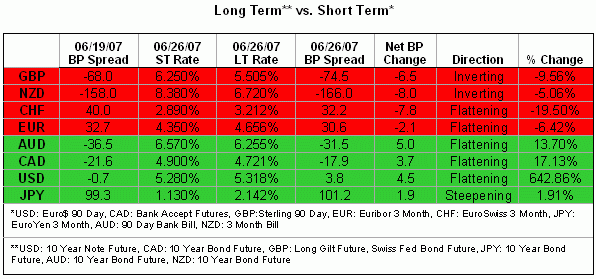|
Will the US Dollar Waver on the FOMC Policy Statement?
A small dose of risk aversion was all that was needed to cool down swelling yields, as rates generally fell back somewhat over the course of the week. In the US, Canada, and Japan, short-term rates eased back amidst weaker economic data. The US, in particular, has been plagued by signs that the housing recession will only continue to impair expansion. However, given persistent price pressures, the Fed is not anticipated to turn dovish anytime soon. In Canada, long-term rates remained elevated as the BOC is widely expected to hike rates on July 10th, but given the slowdown in inflation growth, markets are not expecting much from the central bank thereafter.
Looking ahead, Thursday’s FOMC policy announcement will provide major event risk for bond markets – especially in the US. However, the actual rate decision lacks importance (they are widely anticipated to leave rates at 5.25 percent), as traders will be scouring the Fed’s policy statement for any phrase changes regarding economic growth or inflation.

US Fed – No Rate Relief For Housing This Week
New York Fed President Geithner has made it clear that trying to use monetary policy to navigate market volatility is unfruitful. Is this his signal that the crash of the housing sector and a broad economic slowdown will have little impact on the Fed’s rate decision this Thursday?
Timothy Geithner, Federal Reserve Bank of New York President (Voting Member)
“The dominant instinct of officials is often to try to shield the economy from volatility. But the crises of the 1990s helped demonstrate why this approach can be both futile and counterproductive.” – June 21, 2007
Despite some softness in inflation pressures, über-hawk Fisher is far from complacent:
Richard Fisher, Federal Reserve Bank of Dallas President (Alternate Voting Member)
“If you look at the entrails of all the data there is some encouragement…but we're not there yet…If you look at the CPI which just came out and the producer price index, which is a less reliable index, there were some encouraging signs.” – June 21, 2007
Ever the cheerleader for the US economy, Treasury Secretary Paulson remains convinced that the housing correction is near a bottom, even as dismal reports inundate the news:
Henry Paulson, US Treasury Secretary
“The US housing market correction is at or near the bottom but the fallout from problems in the subprime mortgage market will likely continue.” – June 21, 2007
BOJ – Steady Rates Set To Allow The Carry Trade To Live On
Japanese central bankers and fiscal officials have become experts at sounding very uncontroversial and maintaining a “middle of the road” stance. Such commentary will likely remain status quo until after the LDP elections in July and thus, leaves little reason for the Japanese yen to garner any undue strength:
Toshihiko Fukui, Bank of Japan Governor
“The comments did not take the upper house election into consideration. I don't consider myself either hawkish or dovish. I am in a position to analyze economic conditions objectively.” – June 19, 2007
Toshiro Muto, Bank of Japan Deputy Governor
“The BoJ's nine-member policy board will continue making monetary policy decisions in a forward-looking manner. Rate hikes need one to two years to take effect on adjusting the pace of economic growth and inflation...It is inappropriate for the BOJ to signal rate hike timing in advance.” – June 20, 2007
Koji Omi, Japanese Finance Minister
“Currency rates should reflect economic fundamentals and as a whole the fundamentals of Japan are in good condition.” – June 22, 2007
Hiroko Ota, Japanese Economics Minister
“There is no change in Japan's solid economic fundamentals, which is that the economy is recovering although it has a little weakness in production.” – June 26, 2007
ECB – Awaiting The Trigger
The battle over whether to use money supply as a gauge for monetary policy adjustment rages on, with ECB President Trichet one of the biggest advocates for utilizing the measure. Meanwhile, other central bankers remain comfortable with the prospect of future tightening and appear to be simply waiting for the fundamental trigger to hike to 4.25 percent:
Jean-Claude Trichet, European Central Bank President
“Totally ignoring trend movements in money growth would entail – in my view – excessive and unreasonable risks. Since, over the last two centuries, fluctuations in trend money growth have almost always been followed by fluctuations in trend inflation in the same direction, an upswing in trend money growth points to the existence of upward medium to long term risks to the inflation profile. The practice of …the ECB…of closely monitoring monetary trends in order to identify long-term risks to price stability is therefore validated by the monetary history of the last 200 years.” – June 22, 2007
Miguel Angel Fernandez Ordonez, European Central Bank Governing Council Member
“The successive rate hikes have situated the main interest rate at 4 percent, allowing us to move toward normal monetary conditions. Interest rates continue to be appropriate for the strengthening of domestic demand.” – June 26, 2007
“Higher euro-zone interest rates have been advantageous in cooling Spain's housing and credit markets.” – June 25, 2007
Guy Quaden, European Central Bank Governing Council Member
“We never said the monetary tightening cycle has come to an end.” – June 25, 2007
Lorenzo Bini Smaghi, European Central Bank Board Member
“ECB policy may be too accommodative.” – June 19, 2007
Terri Belkas is a Currency Analyst for FXCM.
|